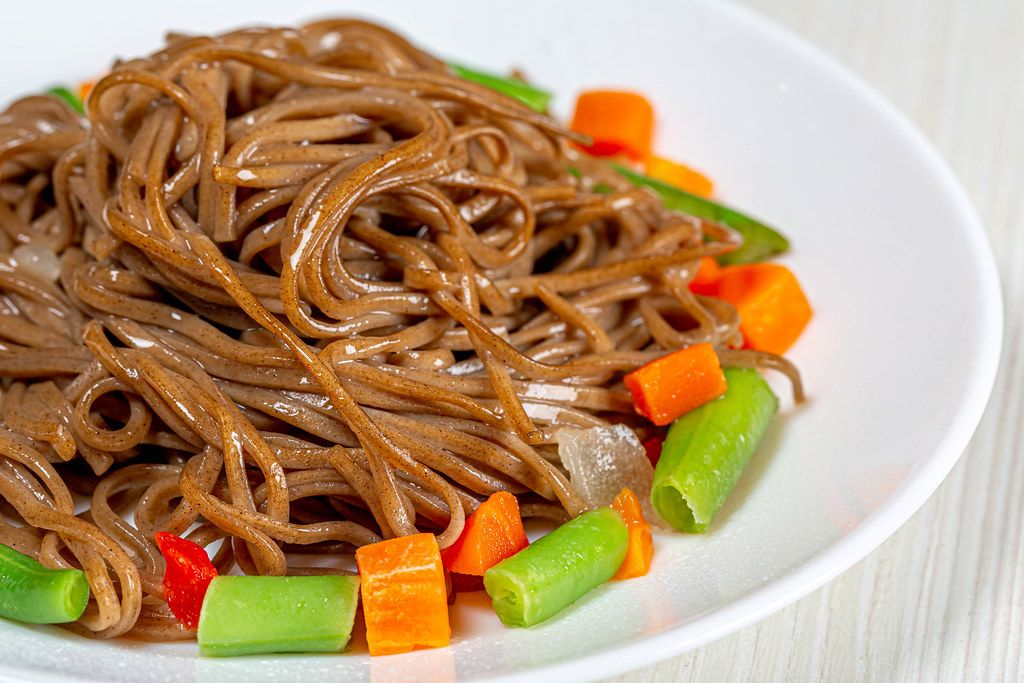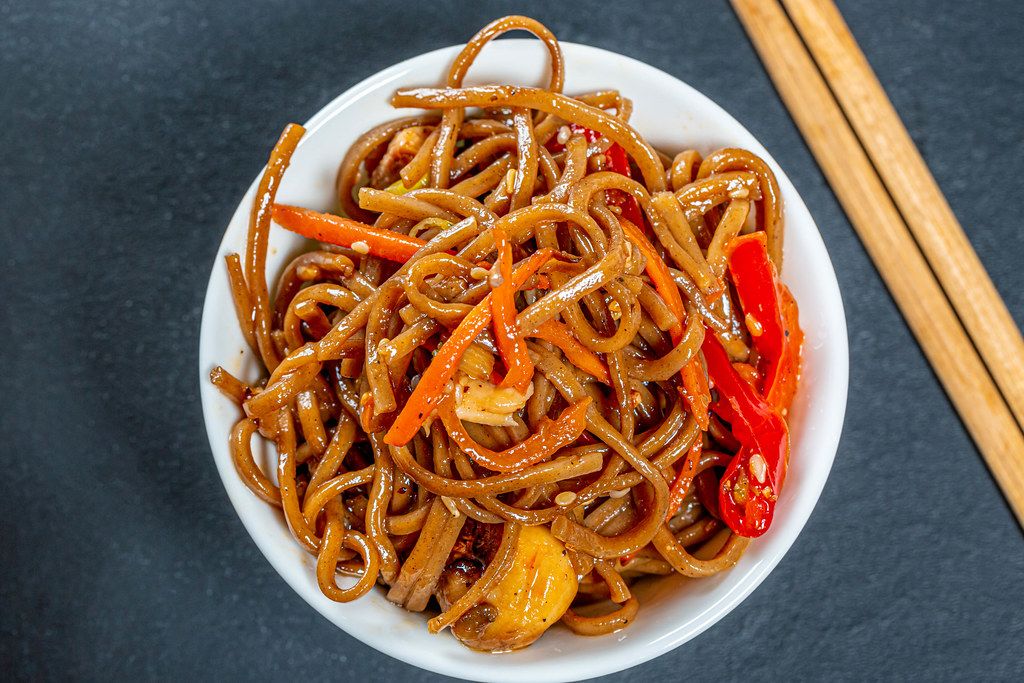Buckwheat in soba noodles offers several benefits: it's gluten-free, high in protein, and rich in essential nutrients like magnesium and manganese. It also contains rutin, an antioxidant that supports cardiovascular health. Additionally, buckwheat has a low glycemic index, promoting stable blood sugar levels, making it suitable for diverse dietary needs.
The Benefits of Buckwheat in Soba Noodles
Introduction
Noodles have long been a staple in global cuisine, cherished for their versatility and comforting flavors. Among the myriad of noodle varieties, soba noodles, made primarily from buckwheat, have gained popularity for their unique taste and health benefits. In this article, we delve into why soba noodles, a beloved element of traditional Japanese cuisine, are favored by food lovers and health enthusiasts alike. Whether you’re a fan of ramen or exploring healthier noodle options, soba noodles offer a nutrient-rich alternative that is both delicious and beneficial.

Overview of the Benefits of Buckwheat in Soba Noodles
Noodles come in various forms, each with distinct qualities and cultural significance. Here’s a quick rundown of some popular noodle types:
- Wheat Noodles: Common in many cultures, wheat noodles are versatile and used in dishes like Italian pasta and Chinese lo mein.
- Rice Noodles: A staple in Southeast Asian cuisine, these noodles are known for their light texture and are gluten-free.
- Glass Noodles: Made from mung bean or sweet potato starch, these translucent noodles are popular in Korean and Thai dishes.
- Instant Noodles: Convenient and quick to prepare, these have become a global phenomenon.
Among these, soba noodles stand out due to their primary ingredient: buckwheat. Unlike many other noodles, soba is gluten-free and rich in amino acids, antioxidants, and vital minerals such as magnesium, manganese, phosphorus, and zinc. These nutrients contribute to a range of health benefits, making soba noodles a preferred choice for those seeking a nutritious meal.
The Benefits of Buckwheat in Soba Noodles with Descriptions and Pricing
Soba noodles offer a delightful culinary experience, whether enjoyed hot or cold. Here are some popular soba dishes that highlight the benefits of buckwheat:
Zaru Soba
A simple yet refreshing dish, zaru soba consists of cold soba noodles served with a dipping sauce. Perfect for summer, it’s loved for its lightness and subtle flavors.
| Ingredients | Approx. Price |
|---|---|
| Buckwheat soba noodles, tsuyu sauce, nori (seaweed) | $10-$15 |
Kake Soba
For a warm, comforting meal, kake soba features soba noodles in a hot broth, often garnished with green onions and tempura.
| Ingredients | Approx. Price |
|---|---|
| Buckwheat soba noodles, dashi broth, soy sauce, mirin | $12-$18 |
Yakisoba
Although traditionally made with wheat noodles, yakisoba can also be prepared with soba for a healthier twist. This stir-fried noodle dish is packed with vegetables and protein.
| Ingredients | Approx. Price |
|---|---|
| Buckwheat soba noodles, cabbage, carrots, sliced pork or tofu, yakisoba sauce | $8-$14 |
These dishes showcase the versatility of soba noodles, offering options for every taste and budget. Whether dining at a restaurant or cooking at home, soba noodles provide a delicious and nutritious option.
Preparation Techniques and Cooking Tips
Cooking soba noodles requires attention to detail to ensure perfect texture and flavor. Here are some tips for preparing soba and other noodle varieties:
Cooking Soba Noodles
- Boil Water: Use a large pot with plenty of water to prevent noodles from sticking.
- Cook Noodles: Add soba noodles to boiling water and cook for 5-7 minutes, stirring occasionally.
- Rinse Thoroughly: Rinse cooked noodles under cold water to remove excess starch and cool them down.
- Serve Appropriately: Depending on the dish, serve soba noodles hot in broth or cold with dipping sauce.
Common Mistakes to Avoid
- Overcooking noodles, which can result in a mushy texture.
- Failing to rinse noodles, which leaves them sticky.
- Using insufficient water, which causes noodles to clump.
Cooking Other Noodle Varieties
Each noodle type has its unique cooking method:
- Wheat Noodles: Cook in boiling water for 8-10 minutes; great for stir-fries and pastas.
- Rice Noodles: Soak in hot water until soft; ideal for pho and spring rolls.
- Glass Noodles: Soak in warm water until translucent; perfect for salads and hot pots.
By mastering these cooking techniques, you can enjoy perfectly cooked noodles every time.

Recipe Ideas and Cultural Significance
Soba noodles are deeply rooted in Japanese culture, often associated with longevity and good fortune. Here are some recipes to try:
Soba Noodle Salad
A refreshing dish featuring soba noodles, fresh vegetables, and a tangy dressing.
- Cook and cool soba noodles.
- Mix with sliced cucumbers, carrots, and bell peppers.
- Toss with a dressing made from soy sauce, rice vinegar, sesame oil, and ginger.
Tempura Soba
A classic Japanese dish where soba noodles are served with tempura vegetables and shrimp.
- Prepare soba noodles as described.
- Fry tempura vegetables and shrimp until golden.
- Serve noodles in a bowl with dashi broth and tempura on the side.
Soba Stir-Fry
A quick and easy meal featuring soba noodles, tofu, and mixed vegetables.
- Stir-fry tofu until golden brown.
- Add vegetables like broccoli and bell peppers; cook until tender.
- Mix in soba noodles and season with soy sauce and sesame oil.
These recipes not only introduce new flavors but also connect you to the cultural heritage of Japan, where soba is a symbol of tradition and health.
Health Benefits and Nutritional Information
Soba noodles are not only tasty but also packed with health benefits:
- Rich in Nutrients: High in magnesium, manganese, and zinc.
- Gluten-Free: Suitable for those with gluten sensitivities.
- Low Glycemic Index: Helps in blood sugar control.
- Supports Heart Health: Contains antioxidants and helps in cholesterol reduction.
- Weight Management: Promotes satiety due to high dietary fiber content.
Incorporating soba noodles into your diet can complement a balanced and healthy lifestyle.
Substitutions and Dietary Preferences
For those with specific dietary needs, here are some substitutions to consider:
Gluten-Free Options
While soba noodles are often gluten-free, ensure that they are 100% buckwheat to avoid gluten contamination.
Low-Carb Alternatives
- Shirataki Noodles: Made from konjac yam, these noodles are low in carbs and calories.
- Zucchini Noodles: Spiralized zucchini makes for a healthy, low-carb noodle substitute.
Vegan Diet
Soba noodles fit well into a vegan diet, providing plant-based protein and other essential nutrients.
These substitutions allow you to enjoy noodles while catering to your dietary preferences.
Pairing Suggestions and Side Dishes
Enhance your noodle meals with these pairing suggestions:
Side Dishes
- Edamame: A protein-rich appetizer that complements soba dishes.
- Seaweed Salad: Offers a refreshing contrast with its tangy dressing.
- Pickled Vegetables: Adds a zesty flavor to your meal.
Sauces
- Ponzu Sauce: A citrusy soy-based sauce perfect for dipping soba noodles.
- Sesame Sauce: Creamy and nutty, ideal for cold soba salads.
Beverages
- Green Tea: A traditional companion that aids digestion and complements the flavors of soba.
- Sake: Pairs well with the umami of soba broth.
These pairings will elevate your dining experience, making each meal memorable.
FAQs
What are soba noodles made of?
Soba noodles are primarily made from buckwheat flour, which is naturally gluten-free and nutrient-rich.
Are soba noodles good for weight management?
Yes, soba noodles are high in dietary fiber, which can help promote satiety and support weight management.
Can I eat soba noodles if I’m gluten intolerant?
Yes, but ensure the soba noodles are 100% buckwheat to avoid gluten contamination, as some may contain wheat flour.
How do soba noodles support heart health?
Soba noodles contain antioxidants and can help reduce cholesterol levels, promoting heart health.
What is the cultural significance of soba noodles in Japan?
In Japan, soba noodles symbolize longevity and are traditionally eaten during New Year’s Eve for good fortune.
Conclusion
Soba noodles offer a nutritious and versatile option for noodle enthusiasts, packed with the benefits of buckwheat. Whether you’re exploring traditional Japanese cuisine or seeking healthy meal alternatives, soba noodles provide a delicious solution. We invite you to experiment with new recipes, explore different noodle types, and perhaps visit a local restaurant to experience the rich flavors and cultural significance of soba noodles firsthand.

